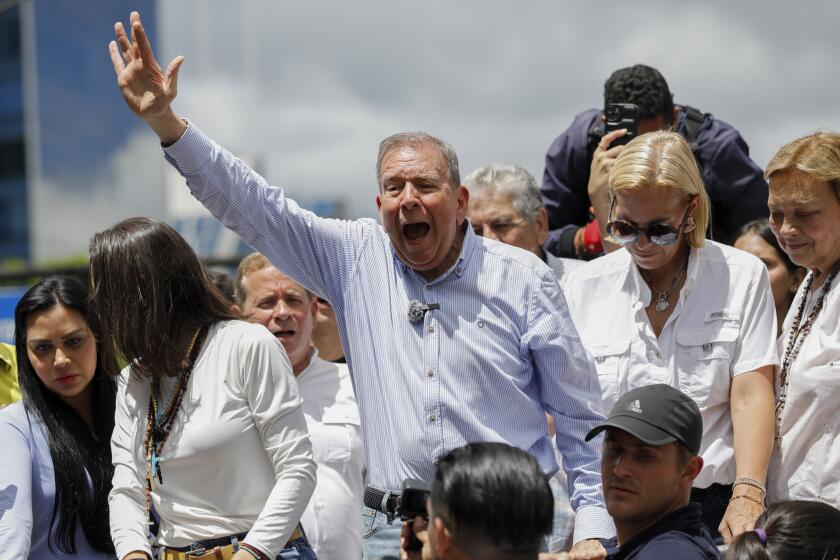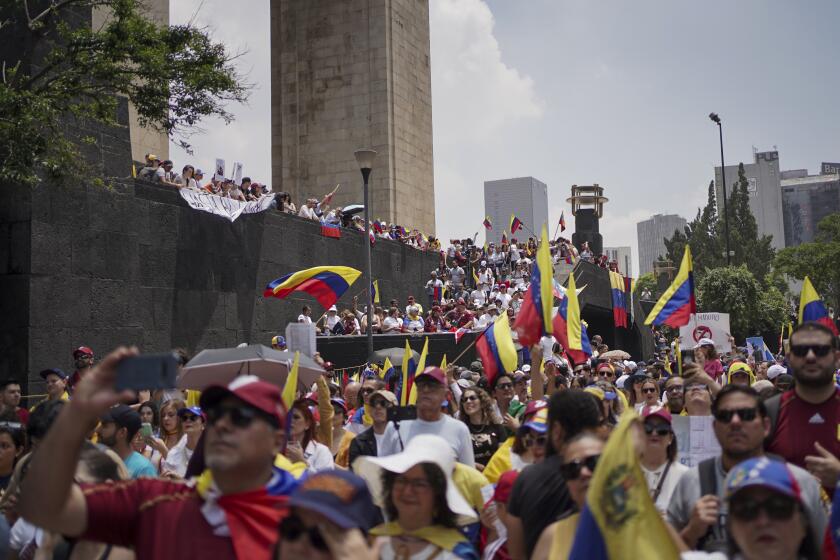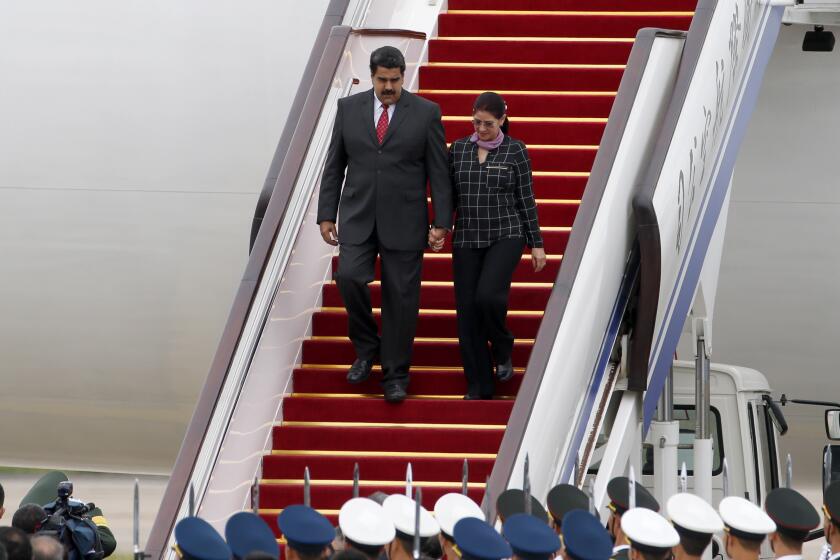Opposition presidential candidate González flees Venezuela for asylum in Spain

- Share via
CARACAS, Venezuela — Former Venezuelan presidential candidate Edmundo González fled into exile in Spain on Sunday after being granted asylum there, delivering a major blow to millions who placed their hopes in his opposition campaign to end two decades of single-party rule.
The surprise departure of the man considered by Venezuela’s opposition and several foreign governments to be the legitimate winner of July’s presidential race was announced late Saturday by Venezuelan Vice President Delcy Rodríguez.
She said the government decided to grant González safe passage out of the country, just days after ordering his arrest, to help restore “the country’s political peace and tranquility.”
González arrived Sunday at a military airport near Madrid, accompanied by his wife and Spanish officials, Spain’s foreign ministry said.
Opposition leader Maria Corina Machado said González feared for his life if he stayed in Venezuela.
Arrest warrant issued for opposition candidate Edmundo González weeks after officials declared President Nicolas Maduro won widely disputed election.
“His life was in danger, and the growing threats, legal citations, arrest orders, and even blackmail attempts that he was subjected to demonstrate that the regime has no scruples or limits in its obsession to silence him and try to break him,” Machado wrote on X.
Spain’s center-left government said the decision to leave Venezuela was González’s alone, and he departed on a plane sent by the country’s air force. González stayed at the Spanish Embassy in Caracas before leaving.
Spanish Foreign Minister José Manuel Albares told Spanish national broadcaster RTVE that his government will grant González political asylum as he requested. Albares spoke from Oman while en route to China with Spanish Prime Minister Pedro Sánchez on a state visit.
“I have been able to speak to [González], and once he was aboard the airplane, he expressed his gratitude toward the Spanish government and Spain,” Albares said. “Of course, I told him we were pleased that he is well and on his way to Spain, and I reiterated the commitment of our government to the political rights of all Venezuelans.”
In a speech before González’s departure was announced, Sánchez said the opposition leader was “a hero whom Spain is not going to abandon.”
The European Union’s foreign affairs chief, Josep Borrell, in a statement Sunday described it as “a sad day for democracy in Venezuela.”
Venezuelans across the world protested the country’s disputed presidential election, which the opposition says it won over the authoritarian Maduro.
Borrell added that González “appears to be the winner of the presidential elections” and that the EU will maintain its support of the Venezuelan people “in their democratic aspirations.”
In a letter sent Sunday to lawmakers, Dutch Foreign Affairs Minister Caspar Veldkamp said that the Netherlands had given González refuge shortly after the election at its embassy. He added that González said at the beginning of September that he wanted to leave the country “and continue his fight from Spain.”
González, a 75-year-old former diplomat, was a last-minute stand-in when Machado was banned from running. Previously unknown to most Venezuelans, he nonetheless rapidly ignited the hopes of millions of Venezuelans desperate for change after a decade-long economic free-fall.
While President Nicolás Maduro was declared the winner of the July vote, most Western governments, including Spain, have yet to recognize his victory and are instead demanding that authorities publish a breakdown of votes. Meanwhile, tally sheets collected by opposition volunteers from more than two-thirds of the electronic voting machines indicate that González won by a more than 2-to-1 margin.
The tally sheets have long been considered the ultimate proof of election results in Venezuela. In previous presidential elections, the National Electoral Council published online the results of each of the more than 30,000 voting machines but the Maduro-controlled panel did not release any data this time, blaming an alleged cyberattack mounted by its opponents from North Macedonia.
Atty. Gen. Tarek William Saab, a staunch Maduro ally, sought González’s arrest after he failed to appear three times in connection with a criminal investigation into what it considers an act of electoral sabotage.
The United States government has seized a plane used by Venezuelan President Nicolas Maduro, citing violations of sanctions and export control laws.
Saab told reporters that the voting records the opposition shared online were forged and an attempt to undermine the National Electoral Council.
Experts from the United Nations and the Carter Center, which at the invitation of Maduro’s government observed the election, determined the results announced by electoral authorities lacked credibility. In a statement critical of the election, the U.N. experts stopped short of validating the opposition’s claim to victory, but they said the voting records it published online appear to exhibit all of the original security features.
Exiled opposition politician Franco Casella told RTVE that González would continue to campaign against the regime from abroad in what he called a dual leadership role with Machado, who Casella said remains in hiding in Venezuela.
He said he understood that some people who opposed Maduro might feel “orphaned” by González’s departure. But, he added, “this is going to be capitalized positively .... and my message is that this is not the time for tears, it is time for us to remain united against the dictatorship.”
Spain has been a major point of exodus for Venezuelans, particularly those leading opposition to Maduro’s regime. They include Leopoldo López, who fled to Spain to reunite with his family in 2020, and Antonio Ledezma, who left in 2017.
Some 44,000 Venezuelans immigrated to Spain in the first six months of this year. The last government statistics from 2022 said that some 212,000 Venezuelans were then residing in Spain.
Rueda, Goodman and Wilson write for the Associated Press. Goodman reported from Miami and Wilson from Barcelona, Spain. Mike Corder contributed from The Hague.
More to Read
Sign up for Essential California
The most important California stories and recommendations in your inbox every morning.
You may occasionally receive promotional content from the Los Angeles Times.













